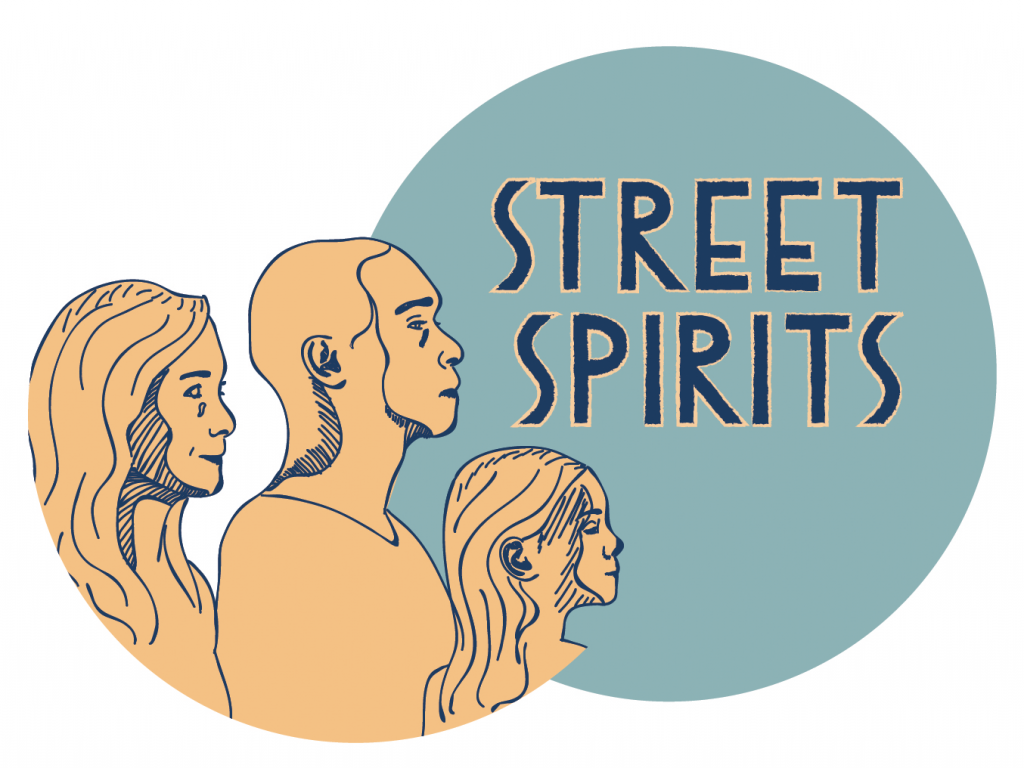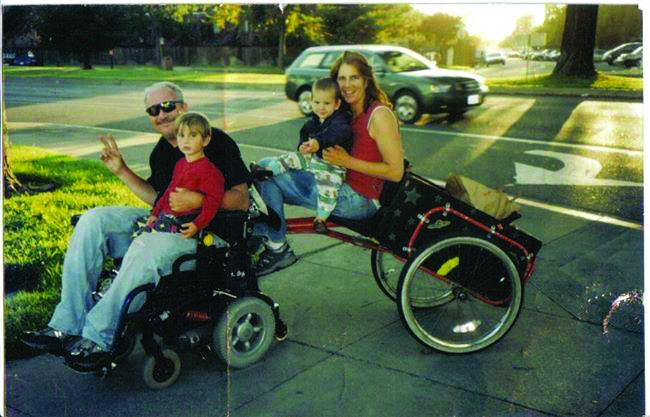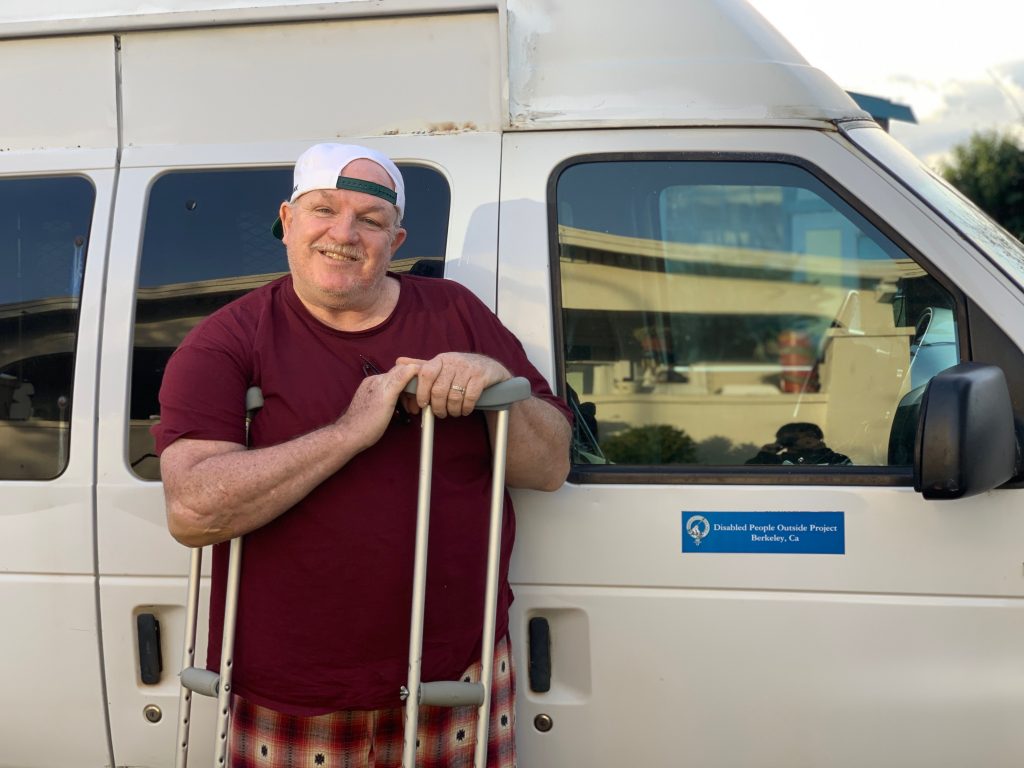

in 1984, Danny McMullan was zipping down the highway on his motorcycle —eager to join his friends by the bay—when he hit a power box. The force of the impact tore his right leg clean off and left Danny, then 21, with broken bones in his pelvis, ribs, arms, clavicle, and back. He was inches from death when the emergency helicopter deposited him at the UC San Diego Medical Center, where he spent the next 14 months of his life. But despite the gravity of his injuries, Danny’s positivity and sense of humor were so infectious that nurses regularly asked him to visit particularly morose trauma patients.
After his release, Danny was sent to Edgemoor Geriatric Hospital, locat- ed in a suburban area of San Diego County. Edgemoor recently received
a collection of national accolades: “As Santee’s Edgemoor skilled nursing facility celebrates a decade in a state-of-the-art facility, it’s becoming ever more clear that the county’s most vulnerable residents are getting some of the best care in the nation,” a 2019 San Diego Union-Tribune article bragged.
But in 1985, Edgemoor was a crumbling, neglected facility running the media gauntlet as official inspections turned up one shocking violation after another—among them, “giving penicillin to an allergic patient; roughing up a patient for sleeping during a meeting; leaving a paralyzed patient [to drown] unattended in a bathtub,” according to a retrospective Los Angeles Times article published in 1990. The facility was nearly shut down after a 1986 U.S. Department of Justice report revealed “patient abuse, deficient patient supervision, inadequate medical care, inappropriate use of restraints and inadequate infection control.”
One day, Danny was in the Edgemoor parking lot when a news crew showed up. “A lady asked me about the place, and it was just a horrible place—a couple days before I got there, a guy with no legs fell off his bed and cracked his head open,” Danny says, “so I told her everything I’d seen.” Later on, Danny was recounting the interview to several of his fellow Edgemoor patients—much to their horror.
“They said, ‘Man, you better get out of here before the story comes out, be- cause they will kill you here,’” Danny remembers, “so I left there on a pair of crutches, and that’s where I started my 15 year odyssey of homelessness.”
By the time Danny was seven, both of his parents had passed away, “so it wasn’t like I could go live with my parents after the accident,” he says. After fleeing Edgemoor, Danny moved in with a family member in Berkeley. One day, he was taking a walk through People’s Park and noticed an older woman picking out donated clothes from a free box.
“I thought [the free box] was the coolest idea ever,” Danny remem- bers. Then, a pair of police officers appeared from the ether, hassling the woman for having too many carts— and the People’s Park community jumped to her defense, surrounding the police and telling them to leave.

“The police skedaddled,” Danny says, “and I went, ‘This is the coolest thing I’ve ever seen!’” Captivated by the solidarity he saw within Berkeley’s homeless community, he became fast friends with the group who lived in People’s Park.
Eventually, Danny’s living situation fell apart. “[The family member I lived with] was a real nut,” Danny explains. He smiles, adding, “Well, just like everyone else in the family—myself included!”
After moving out, Danny found a summer sublet in the basement of a mansion at the top of Dwight Way, across from Clark Kerr Cam- pus. But his friendships with the homeless community in People’s Park caused tensions.
“I was always sneaking them through the window,” Danny says, grinning, “and the landlord didn’t like that at all—most of the Cal students didn’t do that.” With no chance that his lease might be renewed, on the last day of his lease term, Danny’s friends showed up to his basement in-law unit to help him move his belongings to People’s Park.
Despite the supportive community, Danny soon became intimately acquainted with the particular misery that is living outside as a disabled person, with no access to pain medication, no artificial leg, not even a wheelchair—just a pair of crutches so old that all the rubber had worn away from the tips.
“[Most of my homeless friends] can go up in the hills and camp out and never have a problem—nobody sees them,” he explains. “But if you’re disabled, you’re out there on the sidewalk. You’re constantly being harassed, kicked in the ribs every morning.”
Because of his disability, Danny was eligible for Supplemental Security Income—but strangely, his claims were always denied on the grounds that his “condition” would not last longer than a year.
Puzzled, I interject, “So…they thought your leg would grow back?”
Danny throws up his hands: “Guess so!”
In 1992, Danny spent the night on the doorstep of the Social Security office in downtown Berkeley—and the next night, and the night after that. The Social Security staff would come to open the office, and for an entire week they were greeted by a sunny, “Good morning!” from Danny as he rolled his sleeping bag up from the doorstep of the office. He would fol- low the staff in, take the first number, and march over to the desk to ask the clerks to check on his case.
“Nothing, Mr. McMullan,” they’d say, exasperatedly.
And he would thank them and leave—and then turn around, walk back in, and take the next available number.
On Friday morning of that week, Danny was at it again—but this time, the manager appeared out of nowhere and swept Danny away into his office.
“He looked under the table to see if my leg was really gone,” Dan-
ny recalls, “And it was! So he says, ‘We’re going to give you the money, and we’ll let the paperwork catch up later.’”
Danny got a check later that day: “It was the first money I’d seen since 1984.”
But perhaps more importantly, Danny’s new status made him eligi- ble for Medicaid. “That was the first time I had a wheelchair, the first time I had an artificial leg…all these things that I use to be like a normal person,” Danny says.
Getting out and about may have been easier, but sleeping on the ground brought back all the old aches and pains. “I would find leftover Street Spirit newspapers, and they would fit perfectly under my hip,” Danny says. “I’d use them for support, at first, and then I started reading them.”
At the time, Danny was quickly becoming renowned for his homeless and disability rights activism. He was a vocal opponent of anti-homeless actions—especially Berkeley’s Measure O, a sit-lie law, and Measure N, an anti-loitering law, both passed in 1994. Danny’s activism even took him as far as Santa Cruz, where he joined local advocates for Santa Cruz’s homeless population. He was eventually asked to submit articles to Street Spirit and later to sit on its editorial board.

He wrote a lot of obituaries during his time, “So many that my friends always said, ‘I hope you never write about me, brother!’” he laughs.
Then he stops, growing serious: “I wrote a lot about people passing away on the street, because it made me angry,” Danny explains. “Dying—dying is nothing! But dying on the streets is brutal. All the money we spend in this country on crap—and then we let our fellow humans die in the streets.”
In 1998, Danny met his wife, Katy, through a mutual friend. The following year, she became pregnant, making housing a much more urgent concern. But when Danny visited the Berkeley Housing Authority to check his place on the housing list, he was told that his name had already been “called,” but since he did not respond to the notification, he had missed his chance.
“They were like, ‘We sent a letter,’” Danny says, “and I’m like, ‘To where?! I’m homeless!’”
Danny called the newspaper and then, pulling an old trick out of his back pocket, slept on the doorstep of the Berkeley Housing Authority. When the reporter arrived in the morning, he found Danny there, stag- ing a one-man protest with a sign that read, “Why are there so many home- less people in Berkeley?” The reporter spoke with Danny, then went into the office to interview the director. Several minutes later, they emerged together, invited Danny in for a cup of coffee, and gave him a housing voucher and a week to find a place. By the time their first son, Nick, was born, Danny and Katy were living in a small house on Russell Street.
The new stability in Danny’s life has only served to fuel his activism, which has blossomed into several interconnected projects over the years. In 1999, Danny started the Disabled People Outside Project, aimed specifically towards addressing the needs of the disabled homeless community. Following that, he began to plan sleep- outs where the homeless community could connect and problem-solve with the broader community, facilitating food donations from local restaurants and charming police officers into turning a blind eye towards the events.
For some time, Danny had dreamed of organizing a “Poor Tour,” intended to bring the issue of homelessness to the forefront of public debate. With his assistance, a large group of homeless people would set up camp in some objectionably prominent part of town, and when the authorities inevitably came to tear the tents down, Danny would replace them and the group would travel to another highly visible site—then, he thought, they would rinse and repeat until the city was forced to act.

In 2016, the First They Came for the Homeless encampment was swept from its spot outside of the library, and Danny saw his chance to make this dream come to fruition.
“They were all on the sidewalk in front of one of those coffee shops on Telegraph, and I figured they were probably a little PO’d to be back on the sidewalk,” he says. Hoping to channel the group’s anger into ac- tion, Danny rallied the group. They camped in front of City Hall, by the Safeway on Northside, “and just all these spots where they’re going, ‘Get rid of these guys!’”
The last stop on the Poor Tour was by the Here/There sign in South Berkeley, where the encampment has remained ever since.
“It made me feel like I could have power in a world that made me feel pretty powerless at times,” Danny explains. “From the first day of my disability, when I found out I can make people [in the ICU] laugh, I would think ‘If I can help somebody else, I’m not doing so bad.’ It gave me reason to get out of bed—and it still does.”
Street Spirits is a monthly feature in which someone who lives on the street tells us their story.
Julia Irwin is a writer, a recent UC Berkeley graduate, and a soon-to-be law school student.
